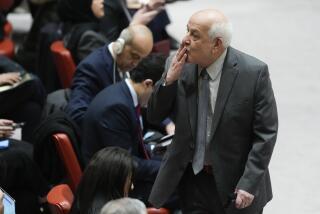U.N. Council Approves Tighter Controls on Iraqi Imports
UNITED NATIONS — The U.N. Security Council approved tighter controls on Iraqi imports Monday, including limits on purchases of speedboats, pesticides, radio broadcast equipment, flight simulators and dosages of antibiotics that the United States and Britain say could be used by the Iraqi military in a war.
Some diplomats, who spoke on condition of anonymity, saw the changes as another sign that Washington and London are preparing for the possible use of force in Iraq, but U.S. and British diplomats said the amendments to existing controls were routine and necessary.
The U.S. wanted to eliminate what Ambassador John D. Negroponte called “loopholes or omissions” in the U.N. “oil for food” program, which allows Iraq to sell oil to buy food, medicine and oil-industry spare parts. Iraq said the resolution would aggravate the suffering of its people, who have been under U.N. economic sanctions since Iraq invaded neighboring Kuwait in 1990.
“This will hinder and create obstacles in the implementation of the oil-for-food program,” Deputy Iraqi Ambassador Mohammed Ali said. “This program has not been able to respond to the needs of the Iraqi people, and nothing but the lifting of sanctions will end their suffering.”
Russia and Syria were the only abstentions in the 13-0 vote on the resolution, which expands an existing list of items that require U.N. approval before they can be purchased by Iraq.
Russia refused to support the resolution because the measure does not ease controls on sales of Russian-made heavy trucks, which the United States and Britain say could be used by the Iraqi military.
Syria, Iraq’s closest council ally, complained that one month of negotiations to add dozens of items to the “goods review list” wasn’t enough time for Damascus to assess whether the changes would be harmful to Iraq’s humanitarian situation.
France supported the measure but expressed annoyance at U.S. pressure. Deputy French Ambassador Michel Duclos said more time should have been taken to negotiate an agreement acceptable to all 15 council members.
“We also had questions, to put it mildly, regarding the method by which this negotiation was being conducted,” Duclos said, referring to U.S. pressure.
U.S. officials wanted to push through the resolution before the council year came to an end and five new countries -- including Germany and Pakistan -- join Wednesday.
The U.S. says many of the items added to the list could be used to produce biological or chemical weapons or to protect Iraqi soldiers from exposure to them. The U.S. said that pesticides containing phosphorus could be used to make chemical weapons and that Iraq could use antibiotics to protect its soldiers from biological weapons.
More to Read
Sign up for Essential California
The most important California stories and recommendations in your inbox every morning.
You may occasionally receive promotional content from the Los Angeles Times.










